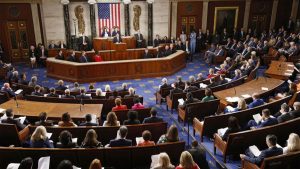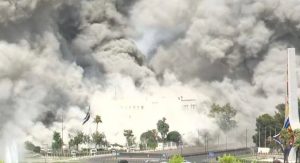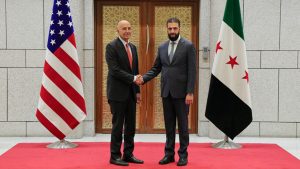By Wilson Daily
The Assad family’s half-century hold on power ended on December 8th after a blistering week-and-a-half offensive by a coalition of opposition forces. That morning, the coalition announced that Bashar al-Assad had fled Damascus, signaling the fall of the regime. From Damascus and Aleppo to Berlin and Washington, DC, Syrians around the world took to the streets to celebrate the end of over fifty years of oppressive rule and the culmination of a thirteen-year revolution against a tyrannical government responsible for some of the worst crimes of the 21st century.
As the country begins its rehabilitation, a big question is being asked in Syria and beyond: what’s next?
An effective democratic transition is key to the future of Syria. Assad refused to follow UN Resolution 2254’s recommendations; his deposition means that this is the first real opportunity to implement it. It calls for “a Syrian-led and Syrian-owned political transition,” the inclusive development of a new constitution, and free and fair elections, with the goal of creating resilient democratic institutions and a strong civil society. The coalition of opposition forces that now rules Damascus will hope to limit disruption to administrative and public services and lobby for humanitarian aid as the country begins to rebuild.
To aid in creating a smooth transitional period, the United States must reconsider its designation of Hayat Tahrir al-Sham (HTS) as a Foreign Terrorist Organisation (FTO). HTS has evolved from a militia into a pragmatic political player since it was first designated as an FTO in 2018 by the US government. Over the past month, it has united Syria to overthrow the Assad regime while staying true to its recent message of tolerance and inclusivity. In tandem with removing HTS from the FTO list, the United States should lift the sanctions placed on Syria during Assad’s dictatorship, only preserving those targeting members of the regime. Until then, foreign organizations and businesses will be wary of engaging with the transitional government for fear of violating US law.
The FTO designation also inhibits cooperation in fighting the Islamic State (ISIS), which views the changing security environment as an opportunity to reestablish its foothold in eastern Syria. The new Syrian government will be a key partner for the United States military and the Syrian Democratic Forces in their decade-long fight against ISIS. Damascus should be included in the efforts to defeat terrorism by the US, not wrongly labelled a terrorist organization itself.
An important step in the rehabilitation process will be the documentation and investigation of the Assad regime’s many war crimes. Accompanying the liberation of prisons like Sednaya were chilling insights into the horrors detainees faced. The international community has long been aware of the mass murders, political imprisonment and torture, and chemical weapons attacks by Assad’s forces on the Syrian people; international organisations will now be able to investigate them much more extensively, utilizing the regime’s detailed documentation of its own atrocities. Collecting, cataloging, and digitizing those documents is critical in preserving evidence of war crimes.
The Syrian Emergency Task Force (SETF) has been aware of mass graves in the Damascus region for several years; last week, its staff was able to access some of the sites for the first time. Mouaz Moustafa, Executive Director of SETF, made an urgent appeal for international experts and war crimes investigators to come to Syria and begin identifying the remains in Qutayfah and in the other mass graves the organization has identified. Studying the orchestrated slaughter of civilians and understanding the plight of each victim is paramount for holding accountable the people who authorized and willingly assisted in these actions. With access to records hidden from the public and physical evidence previously out of reach, the full extent of the regime’s atrocities can be documented and written into the history books, never to be forgotten.
What happens in Syria over the next few months will shape the nation for years to come. It’s critical that democratisation is, as Resolution 2254 says, ‘Syrian-led’, but there are ways the international community can support the new government through bilateral cooperation: lifting sanctions and retracting misrepresentative designations, coordinating expert-driven evidence collection and documentation of regime atrocities, and assisting the millions of internally and externally displaced Syrians who decide to return to their homes.
The Syrian people deserve peace, democracy, economic opportunity, and the chance to hold their oppressors accountable; for the first time in fifty years, they have the opportunity to achieve that.
Wilson Daily is a researcher for OSINT For Ukraine and Syrian Emergency Task Force. He holds an MA in Political Science from University of North Carolina at Chapel Hill and a BA in International Relations from Hendrix College. His work has been been published in the Kyiv Independent.









